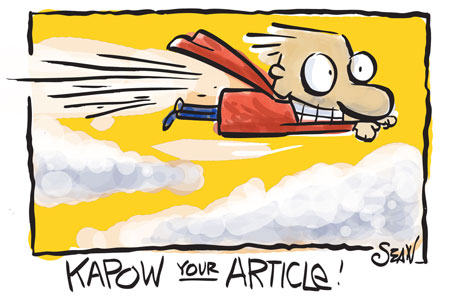
You may not realise it, but your articles are creating a ‘huh’ factor. A ‘huh’ factor is like a speed bump on a road. If you don’t remove that speed bump, it causes the reader to bounce over your words. If you have too many of these speed bumps, it frustrates the reader. And they leave.
So how do you avoid this ‘huh’ factor in your article?
You read it back not just to yourself, but also to folks around you. And watch for the ‘huh’ sound.
So let’s take two lines that are trying to say the same thing:
Line 1: Do you know this causality dilemma question about the chicken and the egg?
Line 2: Do you know about the eternal puzzle of the chicken and egg?
Now read it back aloud
Say to yourself aloud: Do you remember this causality dilemma question?
Then say it to your kids: Do you remember this causality dilemma question?
Then say it to your partner: Do you remember this causality dilemma question?
You'll get the same response: Huh?
Now change the questions to something simpler
Do you know about the eternal puzzle of the chicken and egg?
Then say it to yourself: Do you know about the eternal puzzle of the chicken and egg?
Then say it to your kids: Do you know about the eternal puzzle of the chicken and egg?
Then to your partner: Do you know about the eternal puzzle of the chicken and egg?
And all of them will respond without the ‘huh?'
That's the difference.
The difference is that people get confused when you use difficult words. Difficult words start a downhill slide. And then everything else that follows the difficult words becomes a blur.
If the barrage of difficult words continues, then the blur becomes unbearable. Now understand one thing: Having difficult words is a problem in itself. But when you consider that your audience also has to deal with a difficult concept, then you're making the situation more complex than ever.
But how does the situation become complex?
You have to remember why the reader is reading your article. They're reading it because they want to fill the gaps in their knowledge. So if your reader reads about a topic like “headlines”, for instance, it's because the reader needs to fill that gap. And when we're learning something, there's always what we call a learning curve.
And learning curves are slightly difficult, because we not only have to grasp what's being said, but also think of how we would implement the idea in the article. And so learning always has some factor of intimidation (sometimes a lot of intimidation and sometimes not so much).
If your words are complex, you've suddenly ramped up the intimidation.
If your concept/article is complex, you're sending the reader spinning.
So the best way is to ramp down the intimidation.
And how do you do that?
1) Use simple words.
2) Read your words back.
3) If you get a “huh?” in your brain, rewrite the words.
4) If you're not sure about the “huh”, then read it to a friend, child or partner.
5) Just focus on the words and you'll dramatically improve your article and reduce intimidation.
6) To make an article un-intimidating, you need to make sure you have one thought.
You may not believe you’re causing people to go ‘huh’, but you are. So test it out. Ask others. If they say ‘huh’, you know you’ve got some re-writing to be done.
———————–
Next Step: “My first meeting with a client used to be nothing more than a presentation of my portfolio.”
The Brain Audit has given me a system that I can illustrate to the client, and I can tell I sound much more professional and competent. Also, the system makes my job easier and faster. I don't have to reinvent the wheel every time.
Yes, The Brain Audit is a system that makes communication more effective and makes me appear more professional. It also opened my mind to a new way of seeing my profession.
Not just a designer, but a valuable designer that thinks and can help clients grow.”

Cesare Ferrari,mfwebmarketing,Du Bois, Pennsylvania, USA
Judge for yourself The Brain Audit: Why Customers Buy And Why They Don't
———————
New Products: Introductory Price
1) Do you sometimes wonder if planning books are written just for the ‘organised' people?
Learn Why Most Planning Fails: And The Critical Importance of Chaos in Planning
2) Do you want to put some sanity into your design even though you are not a designer?
Learn how, you can immediately improve your design with some really simple tweaks.
New Product Coming Soon! Testimonial Secrets
———————
“5000bc Membership: Do you know what it's like when you have a marketing problem at midnight and you go crazy? Well, not if you're a 5000BC member! There is just no other place like this.
Please come and join, we existing members are happy to help you tackle your problem while you browse the rest of this huge resource site!”

Gabor Wolf, Marketing Consultant, Budapest, Hungary
Judge for yourself https://www.psychotactics.com/5000bc
———————

Leave a Reply